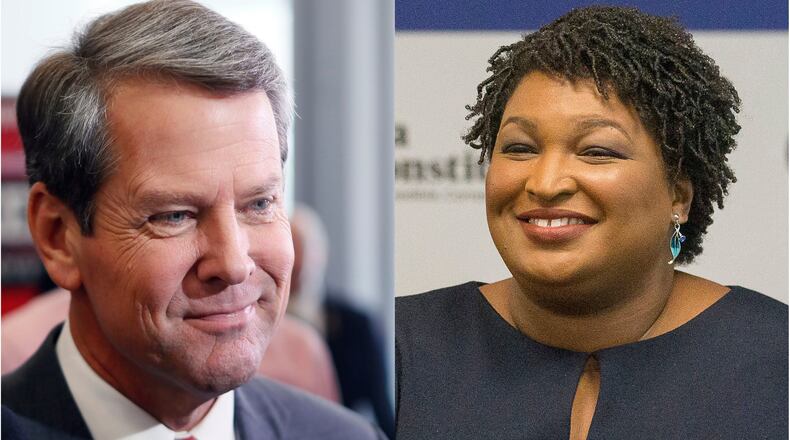Republican Brian Kemp and Democrat Stacey Abrams remain locked in a tight race for Georgia governor less than a month before the election, according to an Atlanta Journal-Constitution/Channel 2 Action News poll that showed an increasingly dwindling number of undecided voters.
The poll showed Kemp ahead of Abrams 47.7 percent to 46.3 percent, a statistically insignificant difference within the poll’s 2.8 percentage point margin of error. Libertarian Ted Metz had 2.3 percent of support, and a slim 4 percent of voters are undecided.
The Sept. 6 AJC/Channel 2 poll showed the candidates deadlocked at 45 percent with 7 percent undecided.
The new poll is the latest to suggest the possibility of a runoff in December if no candidate gets a majority of the vote, though that seems unlikely given the Libertarian’s low support.
The poll holds encouraging news for each political party.
Republicans were likely to cheer the rising approval rating for President Donald Trump, which has edged up roughly 4 percentage points since the September poll, settling at 46.6 percent. His disapproval rating remains steady at about 50 percent.
And Democrats could point to Abrams’ strength among both independents and her party’s core supporters — both groups that she needs to rally to win the race. Her strategy depends on expanding the state’s electorate to capture left-leaning voters who often skip midterms.
Further down the ticket, the poll painted a different picture of two of the other top contests.
In the lieutenant governor’s race, Republican Geoff Duncan leads Democrat Sarah Riggs Amico 45.4 percent to 39.3 percent with 15.3 percent undecided. Republican Brad Raffensperger appears to have a slight edge of 41.4 percent to 36.8 percent over Democrat John Barrow.
The poll was conducted Sept. 30 to Oct. 9 by the University of Georgia’s School of Public and International Affairs. It included 1,232 likely general election voters who said they had voted in recent contests and said they were definitely or probably going to vote in November.
A Kavanaugh effect?
The poll was conducted over a period during which Trump reached a trade agreement with Canada and Mexico, got a good unemployment report and saw the confirmation of his Supreme Court pick after a contentious debate. It's unclear how much of a role the confirmation of Brett Kavanaugh played. Some surveys have suggested the fraught process probing a sexual assault allegation that Kavanaugh angrily denied galvanized Democrats but also energized Republicans.
The AJC poll showed that Trump’s approval increased notably among likely female voters. Last month, only 35.4 percent of women said they approved of the president last month. That’s now up to 40.7 percent. In the governor’s race, a sharp gender gap still persists. Abrams had a lead among women of 50.4 percent to 41.4 percent, and she trailed Kemp among men by about 10 percentage points.
The candidates’ approval ratings also showed a sharp divide. Nearly half of men give Kemp a favorable review, while only about 40 percent of women do. For Abrams, it’s almost a mirror image: About half of women have a favorable opinion of her, while only 35.7 percent of men do.
Among a smaller sliver of independent voters, who made up about 10 percent of the poll’s demographics, Abrams had a lead of 52.3 percent to 28.5 percent for Kemp. She also outpaced Kemp among voters who considered themselves moderates.
The two are making headway with voters on some of their main issues.
Abrams has declared herself the “public education governor,” and she narrowly leads Kemp by about 4 percentage points among voters asked who they trust more to deal with public education. And Kemp, who has tried to burnish a pro-business reputation, tops Abrams 48.9 percent to 41.9 percent with voters asked who they trust to bring jobs to Georgia.
Two other key issues in the race show a more even split. Voters are essentially divided between Kemp and Abrams over which candidate will best deal with health care and which will “stand up for people like you.”
About the Author
Keep Reading
The Latest
Featured



